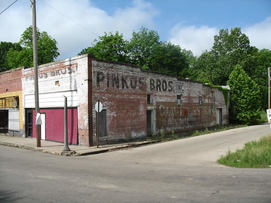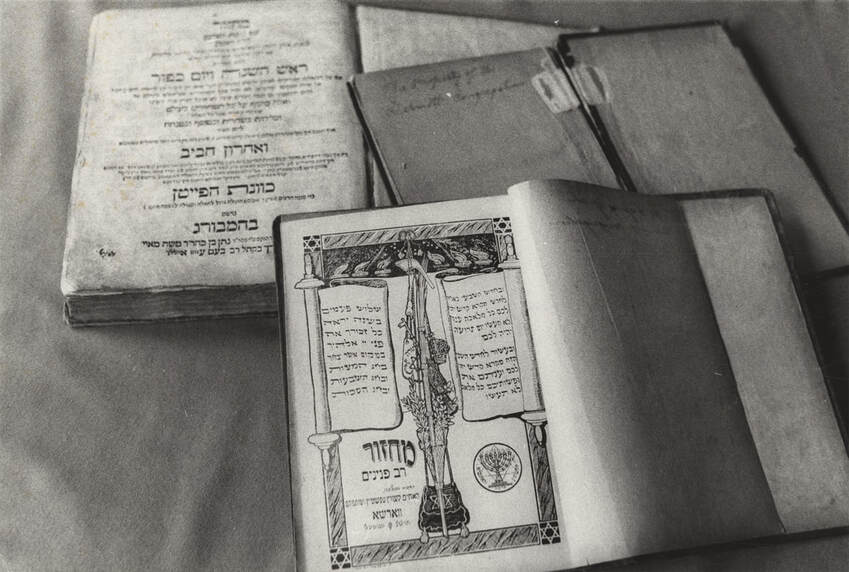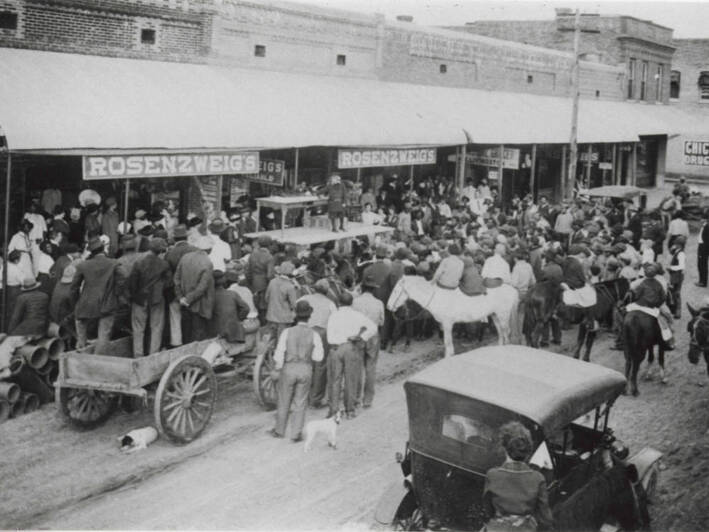Encyclopedia of Southern Jewish Communities - Dermott, Arkansas
Overview
Dermott is a small town in the northwest corner of Chicot County, the southeasternmost county in Arkansas. During the early and mid-19th century, the area attracted Euro-American settlers who imported a large population of enslaved Black workers to clear the land and grow cotton. At the outbreak of the Civil War, enslaved people made up more than four-fifths of the county’s residents. (As of the early 21st century, Black citizens still constitute a majority of the population of Dermott and Chicot County.) The area faced a slow economic recovery immediately after the Civil War, but the arrival of new train lines beginning around 1890 allowed for easier shipping of Chicot County’s cotton and encouraged the growth of the local timber industry.
A handful of Jews made their way to Dermott before 1880, and several Jewish-owned businesses served the community in the early 20th century. A small Orthodox congregation formed there in 1905, which held regular religious services until the late 1920s. By the 1940s the center of local Jewish life had shifted to nearby McGehee, home of Temple Meir Chayim, and most Dermott Jews held memberships there. Historically, Dermott-area Jews also had family and business connections to the larger Jewish community of Pine Bluff. As of 2023 a handful of Jews still live in Dermott.
Early Jewish Settlers

The first Jewish family known to have settled in Dermott were the Kimpels. Ben (or Bernhard) Kimpel peddled in the area around 1870 and soon opened one of the town’s earliest retail businesses. His brother Dave migrated to Arkansas in 1878 and eventually owned businesses and land in and around Dermott. In 1893 Ben Kimpel married Leonora Heller of Bastrop, Louisiana, a town just across the state border from Chicot County. Newspaper reports indicate that he died of a morphine overdose in 1896, and he was buried in Bastrop’s Jewish cemetery. Dave Kimpel remained in Dermott, where he and his family largely assimilated into white, southern society. He married Beulah A. Godwin, a white Methodist from neighboring Ashley County in 1883, and only one of their four children chose a Jewish spouse. Dave also formed business partnerships with non-Jewish men and became the second mayor of Dermott in the 1890s.
Whereas Dave and Ben Kimpel were born in German territories, most subsequent Jewish migrants had roots in Eastern Europe. By 1910 the families of Isadore and Lena Pinkus, Eli and Gussie Dante, Joseph and Sarah Cohen, and others had settled in Dermott and made their living from dry goods stores. Isadore Pinkus also traded in furs and hides and regularly traveled up to fifty miles from Dermott to collect pelts. Census records give Lena Pinkus’ birthplace as Germany, but the others came from Russia or Poland.
Whereas Dave and Ben Kimpel were born in German territories, most subsequent Jewish migrants had roots in Eastern Europe. By 1910 the families of Isadore and Lena Pinkus, Eli and Gussie Dante, Joseph and Sarah Cohen, and others had settled in Dermott and made their living from dry goods stores. Isadore Pinkus also traded in furs and hides and regularly traveled up to fifty miles from Dermott to collect pelts. Census records give Lena Pinkus’ birthplace as Germany, but the others came from Russia or Poland.
Jewish Life in Dermott
In comparison to the Kimpel brothers, the later arrivals retained Jewish more Jewish practices. The Pinkus family were particularly observant and maintained a kosher home during Passover, although that task proved impossible the rest of the year. Eli Dante had received rabbinical training prior to immigrating, and he hosted traditional religious services in his home in the early 20th century.
In 1905 Dante established a small Orthodox congregation which, although it never obtained an official charter, drew participants from approximately seventeen families in Dermott, Lake Village, McGeehee, and Arkansas City. They initially met in private homes but later rented space above the town movie theater. At one time, as many as 75 people attended High Holiday services in Dermott. While Eli Dante led the traditional religious services the women of the congregation, including Gussie Dante, Esther Cohen, and Lena Pinkus prepared and served holiday meals and coordinated housing for out-of-town guests. In addition to holiday services, the group met for prayer services when members observed yahrzeits (anniversaries of family members’ deaths).
The Dermott congregation continued to meet until the late 1920s. When Eli Dante moved to Louisiana in 1927, local services stopped for a time. (The great flood of 1927 caused severe damage in Dermott and surrounding areas and may have precipitated Dante’s move.) Sources suggest that Isadore Pinkus hosted services around 1940, but McGeehee (eight miles north of Dermott) soon emerged as the center of organized Jewish life in the area. After the establishment of Reform congregation Meir Chaim in McGeehee in 1946, Dermott Jews joined the McGeehee synagogue, which accommodated Orthodox worshipers by allowing them to hold separate services.
In 1905 Dante established a small Orthodox congregation which, although it never obtained an official charter, drew participants from approximately seventeen families in Dermott, Lake Village, McGeehee, and Arkansas City. They initially met in private homes but later rented space above the town movie theater. At one time, as many as 75 people attended High Holiday services in Dermott. While Eli Dante led the traditional religious services the women of the congregation, including Gussie Dante, Esther Cohen, and Lena Pinkus prepared and served holiday meals and coordinated housing for out-of-town guests. In addition to holiday services, the group met for prayer services when members observed yahrzeits (anniversaries of family members’ deaths).
The Dermott congregation continued to meet until the late 1920s. When Eli Dante moved to Louisiana in 1927, local services stopped for a time. (The great flood of 1927 caused severe damage in Dermott and surrounding areas and may have precipitated Dante’s move.) Sources suggest that Isadore Pinkus hosted services around 1940, but McGeehee (eight miles north of Dermott) soon emerged as the center of organized Jewish life in the area. After the establishment of Reform congregation Meir Chaim in McGeehee in 1946, Dermott Jews joined the McGeehee synagogue, which accommodated Orthodox worshipers by allowing them to hold separate services.
Business and Civic Life
As in other parts of the rural South, Dermott-area Jews gravitated toward dry goods and clothing retailing. They became an accepted part of local economic life even as they retained a distinct identity, and they generally enjoyed the privileges of white status during segregation. (Jews were not the only ethnic group to develop a presence in the area; Chinese families arrived in Dermott and nearby towns by 1920 and went into the grocery and restaurant businesses.)
On Rosh Hashanah in 1916 the local paper noted simply that “the Jewish merchants of Dermott” were closed “on account of Hebrew Holiday.” The editors presumably assumed that their readers would know which stores were Jewish owned. The same issue includes an ad from the J. Weisman & Co., notifying potential customers that they would open in the evening and encouraging them to “let us show you our new stock of fall dry goods,” as well as a social notice indicating that Joe and Esther Cohen had “motored to Pine Bluff” for the holiday. These newspaper items reflect local Jews’ visibility, their openness about being Jewish, and their relative acceptance into white society.
Acceptance led to positions of political and civic leadership, as it had done for David Kimpel in the 1890s. Eli Dante won election to the board of aldermen in 1916. Abe Abroms, born in the United States to immigrant parents in 1896, arrived in Dermott during World War I. He established a clothing store that eventually opened two other branches in arkansas, one in Louisiana, and one in Mississippi. He also became involved in the wholesale distribution of women’s attire. A well known Dermott booster, he helped to court manufacturers and other large businesses to the area. Abroms’ nephew Joseph Goldstein worked for him in the mid-20th century and likewise earned a reputation for civic leadership. In nearby Lake Village, Sam Epstein became a major landowner after starting out as a peddler and then a shopkeeper. He served on the Chicot County Central Committee, helped organize infrastructure projects, and served as president of the local school board. According to family lore, some Lake Village residents assumed that Epstein was illiterate because they only saw him write in unfamiliar Yiddish script.
Acceptance led to positions of political and civic leadership, as it had done for David Kimpel in the 1890s. Eli Dante won election to the board of aldermen in 1916. Abe Abroms, born in the United States to immigrant parents in 1896, arrived in Dermott during World War I. He established a clothing store that eventually opened two other branches in arkansas, one in Louisiana, and one in Mississippi. He also became involved in the wholesale distribution of women’s attire. A well known Dermott booster, he helped to court manufacturers and other large businesses to the area. Abroms’ nephew Joseph Goldstein worked for him in the mid-20th century and likewise earned a reputation for civic leadership. In nearby Lake Village, Sam Epstein became a major landowner after starting out as a peddler and then a shopkeeper. He served on the Chicot County Central Committee, helped organize infrastructure projects, and served as president of the local school board. According to family lore, some Lake Village residents assumed that Epstein was illiterate because they only saw him write in unfamiliar Yiddish script.
The Late 20th and Early 21st Centuries
As the twentieth century continued, some local Jewish-owned businesses passed to second and third generations. Bernard Levi moved to Dermott from Pine Bluff after marrying Louise Levi, daughter of Joseph Levi, in 1941. She had been brought up in the clothing trade and helped operate as vice president of the Weisman business for decades, while Bernard took a more public role as president and became a well known civic leader. Their son Lawrence took over the store in 1974 and kept it open until the 1980s. Mendel Pinkus, son of Isadore and Lena, ran the family business with his wife, Beulah Fleisig Pinkus, until the 1990s.
By the time that the Pinkus store closed, Southeast Arkansas had experienced a significant decline in its Jewish population, as had most parts of the state. The local Jewish community’s decline took place in the context of a general outmigration from the area. Chicot County’s recorded population peaked at 27,452 people in 1940 and shrank to less than half that amount by 2010. Dermott itself experienced modest growth for most of the late-20th century, claiming 4,715 people in 1990, but the town experienced rapid population loss soon thereafter. As the customer base for Jewish-owned stores dwindled, so did the economic means of the remaining customers. At the same time, national chains claimed an increasing share of the retail market, and younger generations of the Jewish community often chose to leave the area for greater educational, professional, and personal opportunities.
As of the early 21st century, a handful of Jews remain in Dermott and nearby towns, some of them descendants of longstanding Jewish families. Like any number of small, rural towns in and beyond the South, it seems unlikely that organized Jewish life will return to Dermott.
By the time that the Pinkus store closed, Southeast Arkansas had experienced a significant decline in its Jewish population, as had most parts of the state. The local Jewish community’s decline took place in the context of a general outmigration from the area. Chicot County’s recorded population peaked at 27,452 people in 1940 and shrank to less than half that amount by 2010. Dermott itself experienced modest growth for most of the late-20th century, claiming 4,715 people in 1990, but the town experienced rapid population loss soon thereafter. As the customer base for Jewish-owned stores dwindled, so did the economic means of the remaining customers. At the same time, national chains claimed an increasing share of the retail market, and younger generations of the Jewish community often chose to leave the area for greater educational, professional, and personal opportunities.
As of the early 21st century, a handful of Jews remain in Dermott and nearby towns, some of them descendants of longstanding Jewish families. Like any number of small, rural towns in and beyond the South, it seems unlikely that organized Jewish life will return to Dermott.


